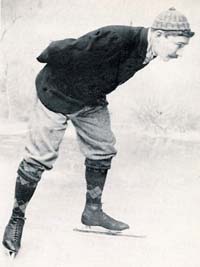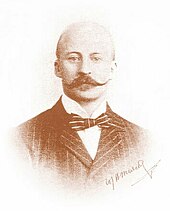International Skating Union
[8] It was founded in Scheveningen, Netherlands, in July 1892,[2] making it one of the oldest international sport federations.
The International Skating Union (ISU)[b] was founded in 1892[10] in the Dutch seaside town of Scheveningen.
[9] The meeting was attended by 15 men, as the national association representatives from the Netherlands, Great Britain, Germany/Austria, and two clubs from Stockholm (Sweden) and Budapest (Hungary).
[14] The United States and Canada formed a competing organization, the International Skating Union of America (ISUA), in 1907.
[18] European and North American figure skaters rarely competed against each other because of differences in their styles of skating.
[24] After 1945, the ISU slowly continued to grow with accession of members from other countries in Europe, Oceania, and (Southern) Africa.
[9] The earliest speed skating competitions hosted by the ISU, between 1976 and 1980, were held under different names but have retrospectively received World Championship status.
In 1994, synchronized skating was formally recognized as a separate discipline,[9] and the first ISU World Championships were held in 2000 in Minneapolis, Minnesota.
[9] After the 2002 Winter Olympics in Salt Lake City, Utah, the ISU implemented changes to many of its events.
[33][34][35] Since the 2000s, the ISU has experienced a new wave of expansion, with several countries in Asia and Latin America joining the organization.
In 2019, skating federations from Chile,[36] Peru,[37] Turkmenistan,[38][39] and Vietnam[40] acquired membership of the ISU.
[41][42] On 28 March 2023 the International Olympic Committee (IOC) issued a statement recommending that Russian and Belarusian athletes be allowed to compete under a neutral flag.
...The Council will continue to monitor the situation in Ukraine and its impact on the ISU activity as well as the decisions and their implementation within the Olympic Movement.
[53] The short program was added to single skating in 1973, which created a three-part competition until compulsory figures were eliminated in 1990.
The cooperation between the two federations is increasing, since both have an interest in more indoor venues with large ice surfaces being built.
[2] There was an attempt to set up an alternative association to replace the ISU for governing and promoting figure skating throughout the world.
[3] Articles of Association define ISU's purpose as The objectives of the ISU are regulating, governing and promoting the sports of Figure and Speed Skating and their organized development on the basis of friendship and mutual understanding between sportsmen.The ISU shall work for broadening interest in Figure and Speed Skating sports by increasing their popularity, improving their quality and increasing the number of participants throughout the world.
[3] In 1967, Jacques Favart, who was the ISU's vice president for figure skating, replaced Ernst Labin as ISU president due to Labin's death six weeks after taking office; Favart served for the next 13 years.
The Director General is responsible for the daily management of all business and financially related activities of the ISU and the operation of the Secretariat.
[88] Run by a Korean event organiser, it offered unprecedented prize money to attract the world's best skaters.
[89] In 2011, Icederby International approached the ISU to enter into a partnership agreement and presented its action plan.
[88] Two professional speed skaters, Mark Tuitert and Niels Kerstholt, lodged a complaint and on 5 October 2015, the European Commission initiated formal antitrust proceedings into alleged anti-competitive restrictions imposed by the International Skating Union on athletes and officials' economic activities and alleged foreclosure of competing alternative sport event organisers.
[91][92] Under the 2016 Eligibility rules, the sanctions imposed on a skater participating in non-authorised events ranged from a warning to periods of ineligibility running from an unspecified minimum to a maximum of a lifetime.
[87] In December 2017, the European Commission decided that ISU's eligibility rules breach EU competition laws.
[7] Whereas the situation regarding TV events appears to be relatively stable, the conclusion of sponsorship agreements becomes more challenging due to a highly competitive market environment.
[7] Thus, ISU has been unable to replace the Speed Skating Title Sponsor with a similarly lucrative agreement.
The interest income on high-rated bonds from Credit Suisse, Banque Cantonale Vaudoise, and UBS accrued at the end of the financial year 2018 amounted to CHF 1.44 million.
The winners of the inaugural edition were Yuzuru Hanyu (Most Valuable Skater), Gabriella Papadakis / Guillaume Cizeron (Most Entertaining Program), Alena Kostornaia (Best Newcomer), Madison Chock / Evan Bates (Best Costume), Eteri Tutberidze (Best Coach), Shae-Lynn Bourne (Best Choreographer) and Kurt Browning (Lifetime Achievement Award).



